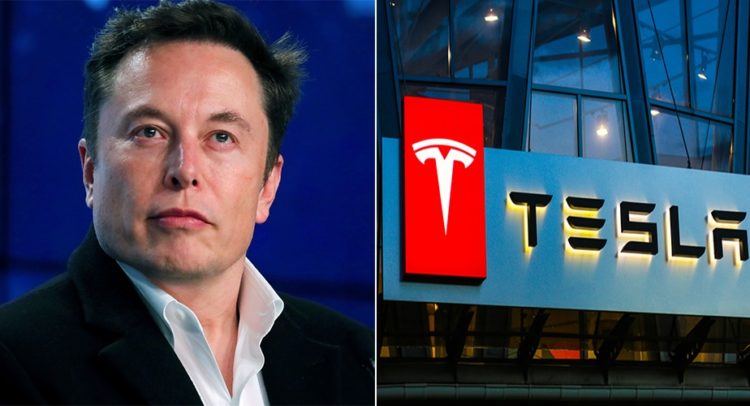In March 2018, Elon Musk struck the mother of all binary compensation agreements with the company he ran (and still runs today): Tesla (NASDAQ:TSLA).
At the time, Musk’s electric car company was valued at roughly $50 billion in market capitalization, but Musk thought he could make it worth much more, so he asked Tesla’s stockholders to approve a long-term compensation plan as follows: If he succeeded in growing Tesla’s market cap to $100 billion, he would receive free shares of Tesla stock as a reward. If he grew the market cap to $150 billion, he would receive more shares. $200 million — even more shares. And so on in $50 billion increments, up to a top potential reward of receiving 20.3 million shares of Tesla stock for growing the company’s value to $650 billion or more.
By late 2020, Tesla’s market capitalization passed the $650 billion mark.
By late 2021, Tesla’s market capitalization reached $1.2 trillion.
It’s closer to $550 billion today, of course, a fact not all investors are happy with (even if reaching this number was hard to even imagine back in 2018). Earlier this year, a Delaware judge ruled in one of these investors’ favor that the compensation plan should not have been approved, denying Musk his financial reward.
Now Tesla wants to change that.
As Barclays analyst Dan Levy explains in a recent research note, detailing the matters coming up for a vote in Tesla’s annual general meeting on June 13, the most important question shareholders face will be whether to retroactively re-approve the compensation plan they originally approved back in 2018, curing any defects in the original approval procedure (such as adding disclosures, and including an independent director’s opinion of the compensation plan’s fairness) to satisfy the judge’s objections. It’s not 100% clear that this vote alone, will overcome the judge’s ruling.
But that’s not the point.
The point is that this vote could have a significant effect on Tesla’s future, on Musk’s future with Tesla, and on Tesla’s stock price.
Elon Musk wants to secure at least a 25% personal voting interest in Tesla to ensure he has a significant say in the company’s direction going forward. If the compensation plan is enacted as originally envisioned, he will end up with a 21% stake in the company, putting him within striking distance of his goal, and probably ensuring he will stay with Tesla and continue working towards his goal. If he’s denied the shares he was promised, however, his ownership stake will fall to just 9% — and he’ll have significantly less incentive to stick around. He might, conceivably, resign from the company to focus instead on his other endeavors, such as SpaceX, the Boring Company, Neuralink, and Twitter (Sorry. I mean “X”).
The fact that large Tesla stakeholders such as Leo Koguan and the CalPERS California’s Public Employee Retirement System have stated they’ll vote against ratification of the compensation plan, while proxy vote advisors such as Glass Lewis and ISS have recommended similar “no” votes to their corporate customers, and the fact that Musk himself and his brother Kimball, who together own 13% of Tesla shares, will be unable to vote their shares, makes rejection of the pay plan a real possibility.
For what it’s worth, Levy thinks shareholders will re-approve Musk’s compensation plan, and all will be well. But in the event Musk is denied his shares, Levy warns: “The risk is skewed notably towards the downside if a rejection materializes.”
Translation: If shareholders make the wrong choice next week, their Tesla stock will drop, and fast.
“Assuming our base case view – a ratified comp plan that supports a path to Elon’s appeal in the
Delaware case – we don’t expect this to be the time when we find out value of the ‘Elon
Premium’ in Tesla stock. Yet even considering such a risk reminds us that eventually he will
move on from the CEO role – a point he has made in the past. And with the recent turnover of
top mgmt at Tesla below Elon, succession planning and key man risk remains an overhang,” Levy opined.
All in all, the Barclays analyst rates TSLA as Equal Weight (i.e. neutral), while his $180 price target suggests the shares will stay rangebound for the time being. (To watch Levy’s track record, click here)
A look at the consensus breakdown does not inspire much confidence either. TSLA stock’s Hold consensus rating is based on 9 Buys, 14 Holds, and 9 Sells. With an average price target of $174.60, the shares are slightly overvalued. (See TSLA stock forecast)
To find good ideas for stocks trading at attractive valuations, visit TipRanks’ Best Stocks to Buy, a tool that unites all of TipRanks’ equity insights.
Disclaimer: The opinions expressed in this article are solely those of the featured analysts. The content is intended to be used for informational purposes only. It is very important to do your own analysis before making any investment.

















